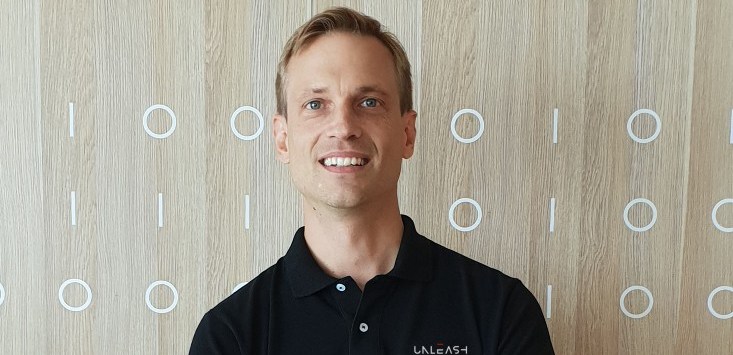
Unleash Live co-founder Hanno Blankenstein. Source: supplied.
AI video analytics platform Unleash Live has raised $8 million in Series A funding, in a round led by Aussie Unicorn SafetyCulture.
Angel investor Roger Allen also contributed, and SafetyCulture founder and chief executive Luke Anear is set to take a seat on the board.
The raise comes after Unleash was able to ride the wave of several different tech trends, compounded by the COVID-19 pandemic, to see 500% revenue growth in the space of 18 months.
Founded by Hanno Blankenstein and Jason Grier back in 2016, Unleash Live is an AI-enabled video analytics platform. It allows its customers — transport and infrastructure companies, for example — to conduct remote inspections using video, receiving analysis in real time as images are taken.
It can be used for incredibly specific maintenance and safety use cases, Blankenstein tells SmartCompany. It can also use video from any device, whether that’s a smartphone, drone or even a satellite.
Customers include resources companies, wind farms and solar farms and owners of ‘vertical’ assets such as siloes.
The product can be used for “anything that is highly sophisticated, highly expensive and far away, usually”, Blankenstein explains.
These are items and infrastructure that require regular inspections to ensure safety, he says. Unleash Live is designed to help them operate as efficiently as possible.
The next evolution
SafetyCulture’s own $99 million round recently landed it a valuation of $2.2 billion, placing it well and truly in Australia’s unicorn club. Both the business and Anear himself are big names in the Aussie startup scene.
Securing funding from the unicorn is a “phenomenal endorsement” for Unleash and the team, Blankenstein says.
He also values having the support of another Aussie business working in the deep tech sector. That’s an important step in fostering the local ecosystem, he says, ensuring startups work and innovate together.
The raise did attract interest from US investors, but keeping it Aussie was a very deliberate decision.
“It’s almost the next evolution of startups,” Blankenstein says.
“We need to all make sure that we build this ecosystem here to really have a sustainable scale-up infrastructure,” he adds.
An app store for AI
This funding will first and foremost be used to help build out the tech and strengthen enterprise relationships, offering broader machine learning services, and more targeted AI models.
There’s an opportunity to build in use cases that are very specific to one customer, Blankenstein explains, but it can also be scaled out across the sector.
Then the focus will be on ramping up business development and sales efforts, primarily in the US and Australia, as well as through co-sales with various partners.
Finally, Blankenstein and the team are building out an AI app store.
“We recognise that we cannot build and deliver every single vision machine learning application ourselves,” he says.
So, he says, they will open up the platform to allow other computer-vision developers, as well as universities and data scientists, to build their own applications and launch them — maybe even monetise them.
“There’s a really big, untapped market of many developers sitting at universities or research companies that have great machine learning algorithms,” Blankenstein explains.
“We provide this high-performance platform for them to deploy on.”
A COVID boom
The founders secured a seed round back in 2018, and essentially went into stealth mode for the next three years.
They got their heads down and focused on building out the technology, proof-of-concept and R&D.
By the end of 2019, they were ready to launch and monetise the product. It turns out, they were in the right place at the right time, with the right product.
March 2020 brought with it the dawn of the COVID-19 crisis, meaning people were unable to travel. Yet, large-scale infrastructure and assets still needed to be inspected.
“There was an immediate need for our offer,” Blankenstein says.
Unleash is now well out of stealth mode and going gangbusters, having recorded 500% revenue growth in the past 18 months.
From their Sydney HQ, the team has sold to several clients in the US, including the operator of the railway lines between Miami and Fort Lauderdale.
They have also onboarded wind farms in South Australia, Western Australia and Victoria. All of this has been completed via digital activations, entirely remotely.
As is the case with so many tech trends, Blankenstein believes this is the way the industry was going anyway. The pandemic likely accelerated uptake of this tech, but there were other trends that happened to come together, he explains.
First, he points to broader availability of high-speed network capabilities.
Second, camera sensors and drone technology are only getting better and better, and standard smartphone cameras are much improved, too.
Graphics processing units (GPUs) are getting faster and better, he adds, and can be cloud-based.
“It just gets more powerful,” Blankenstein says.
“It was not by chance that we launched in 2019 … we planned this for a long time.”
Handpicked for you

Meet Reel.Reviews, the video testimonial startup that’s boosting website conversions for leading e-commerce players



COMMENTS
SmartCompany is committed to hosting lively discussions. Help us keep the conversation useful, interesting and welcoming. We aim to publish comments quickly in the interest of promoting robust conversation, but we’re a small team and we deploy filters to protect against legal risk. Occasionally your comment may be held up while it is being reviewed, but we’re working as fast as we can to keep the conversation rolling.
The SmartCompany comment section is members-only content. Please subscribe to leave a comment.
The SmartCompany comment section is members-only content. Please login to leave a comment.